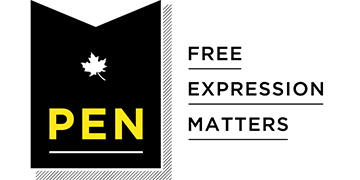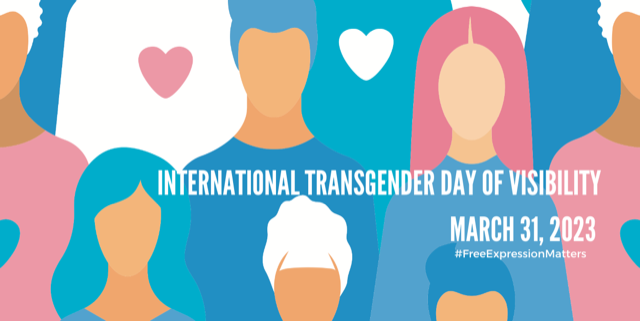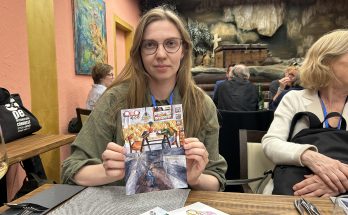For International Transgender Day of Visibility, on March 31, PEN Canada asked S. Bear Bergman to write about the recent wave of book bans in the United States and the growing threat such bans pose to queer and trans writers. Between July 2021 and June 2022, PEN America recorded 2,532 instances of books bans placed on 1,648 books, 1,261 authors, 290 illustrators, and 18 translators.
The work of making children’s and young adult literature is always about populating the imaginations of young readers with representations that may function, in the words of the great Dr Rudine Sims Bishop, as either a window – to see into another child’s life and experiences – or as a mirror, reflecting their life and experiences back to them. In my work – both as a writer on queer and trans topics and as the publisher of Flamingo Rampant which makes racially-diverse, feminist children’s books celebrating 2SLGBTQ+ kids, families, and communities – I am constantly concerned with what I have termed “justice of the imagination,” the critical responsibility of showing all kids that any kid can be the hero of a story. As school systems, municipalities, and even entire states in the US move to ban (or “review”) books that feature 2SLGBTQ+ people, not only is this location of justice at risk, but so are the careers of 2SLGBTQ+ writers and publishers – even in Canada.
As a writer on queer and trans topics I am constantly concerned with what I have termed “justice of the imagination,” the critical responsibility of showing all kids that any kid can be the hero of a story.
When asked to write this piece, my first concern was that of book sales and, in turn, book acquisitions. Let’s follow the path of a children’s book like Pride Colors by Robin Stevenson or M is for Mustache by Catherine Hernandez, both sweet and simple Pride-themed books aimed at 3-6 year olds. If one of these books is banned within a school district, or placed in a “review” queue which can stretch out for years and is overseen by a panel of local residents, there is obviously no further possibility of sales in that district. That, unfortunately, also means it’s likely that the book will be challenged at the library, and very possibly that local bookstores (if they exist) will decline to stock it lest they bring the slavering dogs of censorship to their own doorsteps. Now, a whole region or county has become hostile to that book, at least publicly, and of course this causes sales to decline.
How hostile? In states like Florida, a teacher who allows a book that has been banned or is under review into their classroom faces a third-degree felony charge, punishable by five years in prison and a $5,000 fine (in addition to the loss of their teaching credential and right to vote if convicted). In North Dakota, the state legislature is considering a ban on all “sexually explicit” books, including any that include 2SLGBTQ+ characters or identities, and proposing a mandatory 30-day jail sentence for any librarian who displays such a book – or, indeed any person who displays it in a place where children might visit. Now even a queer-friendly occupational therapist risks a fine or imprisonment for putting Pride Colors in a basket of books to peruse.
In North Dakota, the state legislature is considering a ban on all “sexually explicit” books, including any that include 2SLGBTQ+ characters or identities, and proposing a mandatory 30-day jail sentence for any librarian who displays such a book.
As these laws come into effect, not only will banned queer and trans books not have the markets they once did as educators and librarians worked to create inclusive classrooms, but those same professionals will be forced to view any book with 2SLGBTQ+ content, or by an author from those communities, as dangerous. There goes the school and library market for entire states. For children’s and YA authors those markets are a critical part of how their books sell and are introduced to children who buy their own copies. Editors looking for new books to acquire, even within Canadian publishing, will obviously have to think twice about acquiring books that can’t be sold to any institution in wide swathes of the US. What’s more, the authors of those books won’t have the sales their books deserve when the time comes to do the math on their next advance.
Beyond that, as if the cascade of disaster wasn’t yet bad enough, the political clamour recycling the idea that 2SLGBTQ+ people are predators and should not be allowed around children also affects authors’ ability to do school visits – including my own. In the week between being asked to write this article and finishing it, I had a Canadian school visit interrupted by irate parents, who pulled their kindergartener out of school for the remainder of the day so their child wouldn’t be “influenced” by me reading M is for Mustache. Authors of books for children and young people rarely see anything like the advances that their counterparts in adult fiction do, and one of the ways we make ends meet is through school visits and writers-in-schools programs. The school I was visiting backed me up, but of course everyone was startled and shaken. I would find it hard to blame them if they shied away from another visit by a queer or trans writer anytime soon.
As these laws come into effect, educators and librarians will be forced to view any book with 2SLGBTQ+ content, or by an author from those communities, as dangerous.
It’s easy to imagine that American-style flag-waving conservatism and all its excesses can be treated like a spectacle by Canadians, a circus tent we might peer into but can leave whenever we like. For writers, though, and especially queer and trans writers, this couldn’t be further from the truth. Beyond the slow but steady creep of terrible, caustic ideas that encourage us to fear our neighbour and revile anyone different from us, the livelihood of any writer who takes up a controversial topic – a group which now includes racial justice, feminist principles including equity for marginalized genders, and many other questions of equity – is at risk. There’s no other conscientious path forward at this point for Canadian publishing than to become even greater champions of our marginalized writers, to loudly claim and support them, and to continue to speak up about any attempt – anywhere – to abridge the right of children to justice of the imagination.
 Bear Bergman
Bear Bergman
S. Bear Bergman is an author, storyteller, educator and the founder and publisher of children’s book press Flamingo Rampant, which makes feminist, culturally-diverse children’s picture books celebrating LGBT2Q+ kids and families. He writes creative nonfiction for grown ups, fiction for children, the advice column Asking Bear, and was the co-editor (along with Kate Bornstein) of Gender Outlaws: The Next Generation. These days he spends most of his time making trans cultural competency interventions any way he can and trying to avoid stepping on Lego. His latest book is Special Topics in Being a Human from Arsenal Pulp in the fall of 2021
Photo credit: Zoë Gemelli




